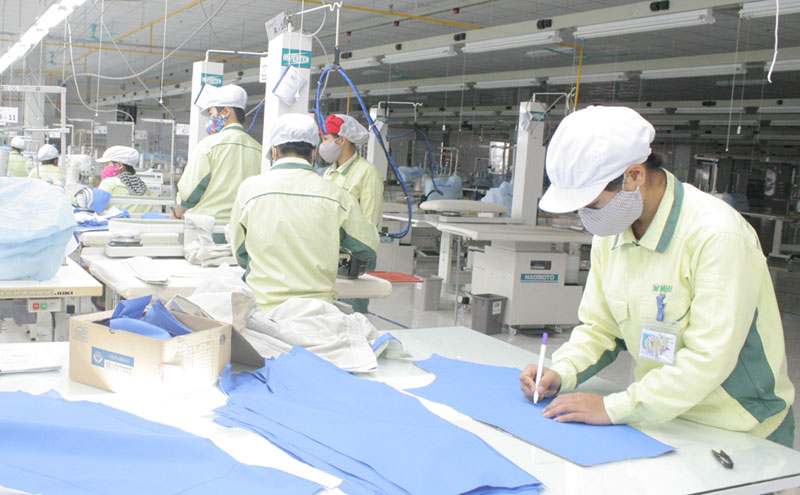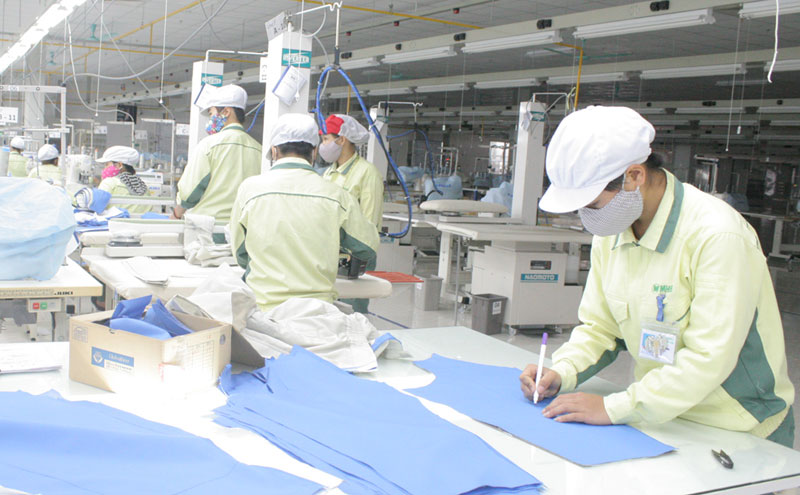
(HBO) - Midori Apparel Vietnam Hoa Binh Co., Ltd is located in Luong Son Industrial Park, which was established in 2011. It is a 100% foreign direct invested enterprise. The company specializes in manufacturing and processing workwear, casual wear, labor protection equipment and labor safety helmets. The factory of the company has its production scale of 1.3 - 1.5 million products / year, the total area of factory is 30,000 m2. From the time of its establishment, the company has always paid attention to the implementation of the law on occupational safety and health (OSH).

Midori Apparel Vietnam Hoa Binh Co., Ltd is
fully equipped with personal protective equipment, ensuring the safety of
workers in the production process.
The company has 1,250 employees. Implementing
the regulations on OSH, the company has focused on building and improving the
working conditions for the employees, thereby improving the quality of
products, providing the products with the best quality to meet the needs of the
customers of Vietnam and other potential partners such as USA, Japan,
Singapore, etc. The products of the company are all evaluated well by the
customers, ensuring timely delivery time, the number of orders of commodities
are constantly rising. From 2017, the Company has set up the Safety and Health
Department according to the regulations, strictly implementing the provisions
of the Labor Safety Law.
For machinery and equipment with strict
occupational safety requirements such as forklifts and lifts, the company
conducts periodical inspections according to regulations on inspection for each
type of equipment and fully report to the Department of Labor, War Invalids and
Social Affairs according to the law. In addition, Midori Company attaches great
importance to the application of innovations, science and technology to
production, improvement of working conditions, raising productivity and quality
of labor. The Company has set up and promoted the role of the Trade Union
organization to take care of the legal and legitimate benefits of the employees
and propagate the Party's and State's plans, policies and laws, such as the
Enterprise Law, Tax Law, Labor, Salary, Insurance, Environment; Regulations on
fire prevention, OSH, etc.
According to data from the Hoa Binh Provincial Party Committee, the industrial production index for the first six months of 2025 is estimated to have increased by 20% compared to the same period last year. This marks the highest year-on-year growth rate for this period since 2020.
In the first six months of 2025, Hoa Binh province’s export turnover was estimated at 1.145 billion USD, marking an 18.11% increase compared to the same period in 2024. Import turnover was estimated at $ 804 million, a 17.15% increase, which helped the province maintain a positive trade balance.
The lives of the ethnic minority farmers in Tan Lac district have gradually improved thanks to the new directions in agricultural production. This is a testament to the collective strength fostered through the professional associations and groups implemented by various levels of the district’s Farmers’ Union.
With the motto the "product quality comes first,” after nearly one year of establishment and operation, Muong village’s Clean Food Agricultural and Commercial Cooperative, located in Cau Hamlet, Hung Son Commune (Kim Boi district), has launched reputable, high-quality agricultural products to the market that are well-received by consumers. The products such as Muong village’s pork sausage, salt-cured chicken, and salt-cured pork hocks have gradually carved out a place in the market and they are on the path to obtaining the OCOP certification.
In the past, the phrase "bumper harvest, rock-bottom prices" was a familiar refrain for Vietnamese farmers engaged in fragmented, small-scale agriculture. But today, a new spirit is emerging across rural areas of Hoa Binh province - one of collaboration, organisation, and collective economic models that provide a stable foundation for production.
Maintaining growing area codes and packing facility codes in accordance with regulations is a mandatory requirement for agricultural products to be eligible for export. Recently, the Department of Agriculture and Environment of Hoa Binh province has intensified technical supervision of designated farming areas and packing facilities to safeguard the "green passport" that enables its products to access international markets.



